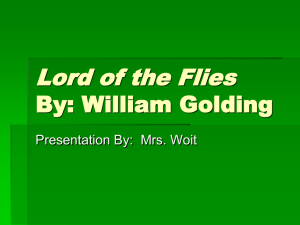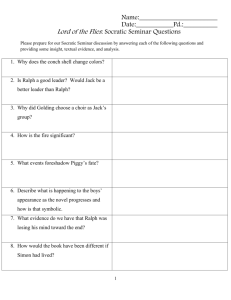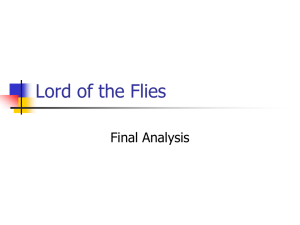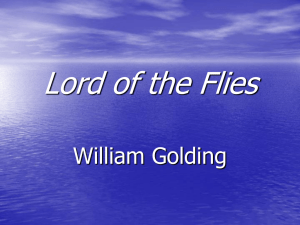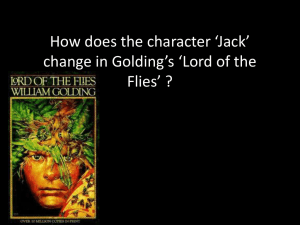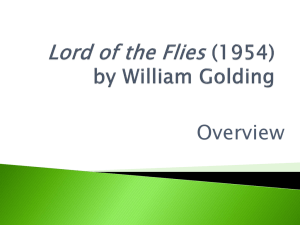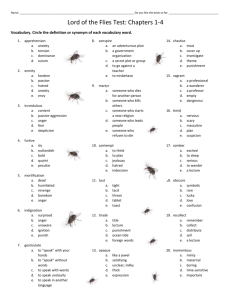Lord of the Flies by William Golding – Book Report #1 (500 points
advertisement
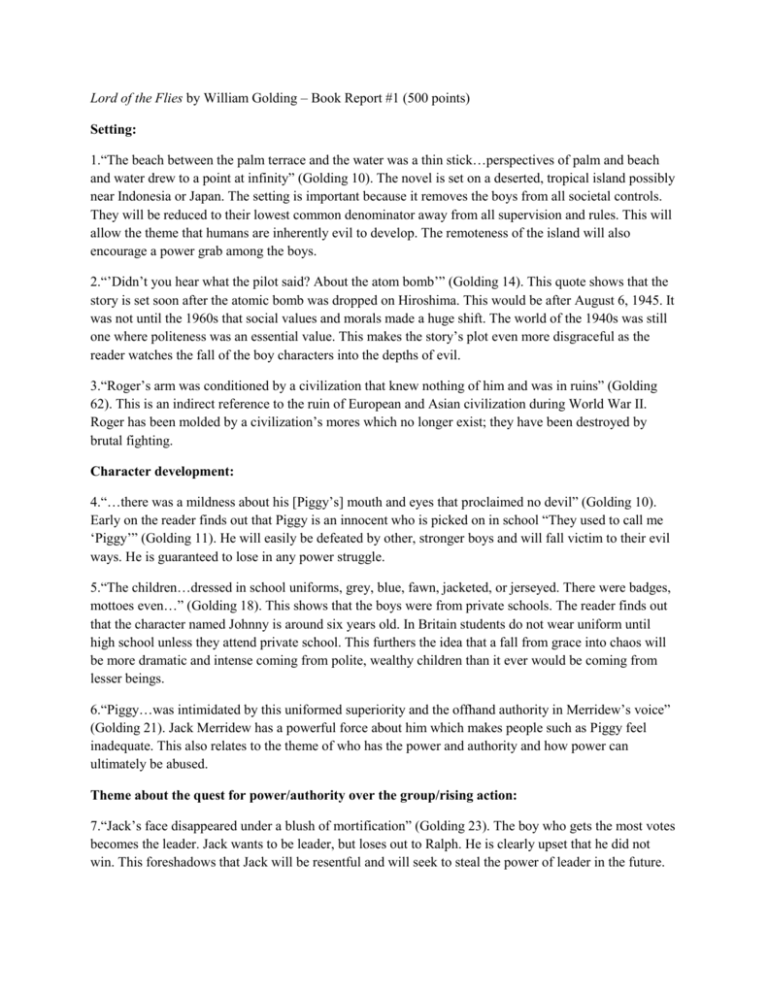
Lord of the Flies by William Golding – Book Report #1 (500 points) Setting: 1.“The beach between the palm terrace and the water was a thin stick…perspectives of palm and beach and water drew to a point at infinity” (Golding 10). The novel is set on a deserted, tropical island possibly near Indonesia or Japan. The setting is important because it removes the boys from all societal controls. They will be reduced to their lowest common denominator away from all supervision and rules. This will allow the theme that humans are inherently evil to develop. The remoteness of the island will also encourage a power grab among the boys. 2.“’Didn’t you hear what the pilot said? About the atom bomb’” (Golding 14). This quote shows that the story is set soon after the atomic bomb was dropped on Hiroshima. This would be after August 6, 1945. It was not until the 1960s that social values and morals made a huge shift. The world of the 1940s was still one where politeness was an essential value. This makes the story’s plot even more disgraceful as the reader watches the fall of the boy characters into the depths of evil. 3.“Roger’s arm was conditioned by a civilization that knew nothing of him and was in ruins” (Golding 62). This is an indirect reference to the ruin of European and Asian civilization during World War II. Roger has been molded by a civilization’s mores which no longer exist; they have been destroyed by brutal fighting. Character development: 4.“…there was a mildness about his [Piggy’s] mouth and eyes that proclaimed no devil” (Golding 10). Early on the reader finds out that Piggy is an innocent who is picked on in school “They used to call me ‘Piggy’” (Golding 11). He will easily be defeated by other, stronger boys and will fall victim to their evil ways. He is guaranteed to lose in any power struggle. 5.“The children…dressed in school uniforms, grey, blue, fawn, jacketed, or jerseyed. There were badges, mottoes even…” (Golding 18). This shows that the boys were from private schools. The reader finds out that the character named Johnny is around six years old. In Britain students do not wear uniform until high school unless they attend private school. This furthers the idea that a fall from grace into chaos will be more dramatic and intense coming from polite, wealthy children than it ever would be coming from lesser beings. 6.“Piggy…was intimidated by this uniformed superiority and the offhand authority in Merridew’s voice” (Golding 21). Jack Merridew has a powerful force about him which makes people such as Piggy feel inadequate. This also relates to the theme of who has the power and authority and how power can ultimately be abused. Theme about the quest for power/authority over the group/rising action: 7.“Jack’s face disappeared under a blush of mortification” (Golding 23). The boy who gets the most votes becomes the leader. Jack wants to be leader, but loses out to Ralph. He is clearly upset that he did not win. This foreshadows that Jack will be resentful and will seek to steal the power of leader in the future. 8.“’I agree with Ralph. We’ve got to have rules and obey them. After all, we’re not savages. We’re English …’” (Golding 42). At this point, Jack feels that power can be harnessed through the use of rules. This quote might also work for the theme of evilness of human nature – to show the boys’ descent. 9.“So Ralph asserted his chieftainship… Jack was powerless…they were on different sides of the barrier” (Golding 73). This shows that boys have been split into two sides. Ralph is furious with Jack because he let the fire out and then a ship passed by. However, Jack got meat for everyone to eat. Theme about inherent evilness of human nature/rising action: 10.“’I was just waiting for a moment to decide where to stab him’” (Golding 31). This shows that Jack’s tendency towards evil has not yet surfaced and he is unable to kill the piglet. It is too early in the story’s plot. He still feels the confines of rules placed upon him by society. 11.“’You couldn’t have a beastie, a snake-thing, on an island this size’” (Golding 36). In literature the snake is often an indirect allusion to the snake found in “Genesis.” The snake is a symbol which represents evil. The boys think there might be a ‘beastie,’ but what they have not yet realized is that the beast is the evil which resides within every human being. 12.“There was a space round Henry…into which he [Roger] dare not throw [stones]…the protection of parents and school and policemen and law” (Golding 62). Here Roger is still clinging to the last vestiges of manners and decency. 13.“’I cut the pig’s throat,’ said Jack, proudly…” (Golding 69). This shows that Jack is beginning to drop the controls placed on him by a distant society. He enjoyed killing the pig. 14.“They understood only too well the liberation into savagery that the concealing paint brought” (Golding 172). This shows that Ralph and Piggy understand that when Jack’s tribe members wear paint, they have descended into complete savagery and barbarism. Ralph and Piggy will not be able to negotiate with Jack’s group. They have become pure evil and have dropped all vestiges of civilization. Encyclopedia source: 15. “Lord of the Flies [is] the story of a group of schoolboys isolated on a coral island who revert to savagery. Its imaginative and brutal description of the rapid and inevitable dissolution of social mores aroused widespread interest [and is] the story of the essential violence and depravity of human nature” “William Golding Biography” 1). “William Golding: Biography.” Bio. True Story. Encyclopaedia Britannica. <http.//www.biography.com/people/William-golding-9314523>. Web. 7 Feb. 2012. I tried to use quotations mainly from the beginning third so that I would not use up all the best ones. Because of this, I do not have theme quotes from around the climax. You must have. Please note that when a character speaks, it is necessary to use double/single quotes.
